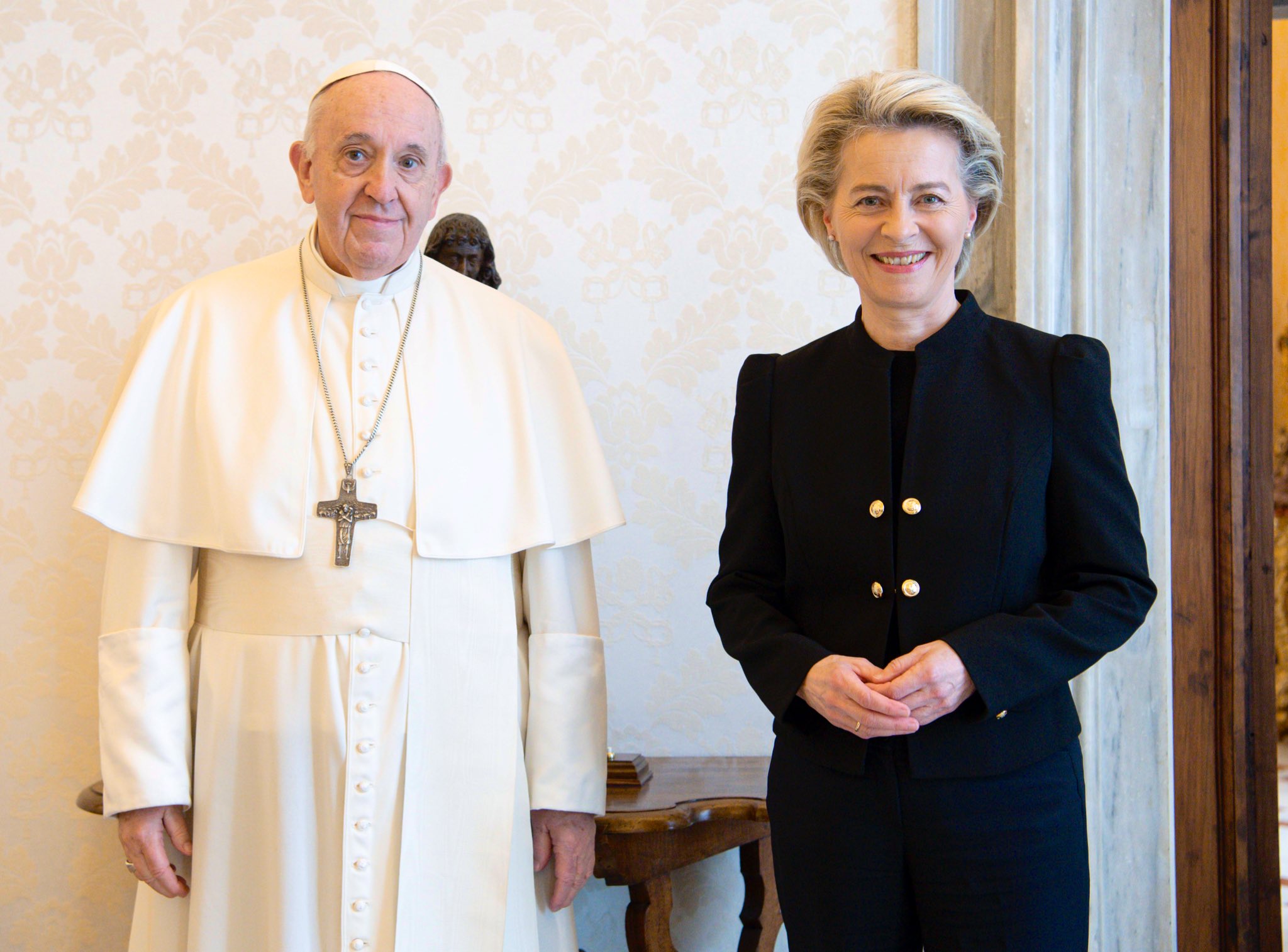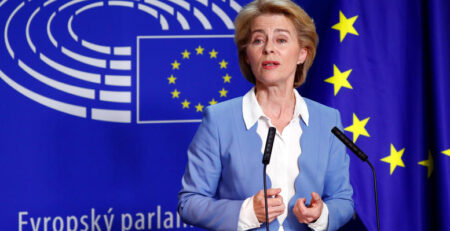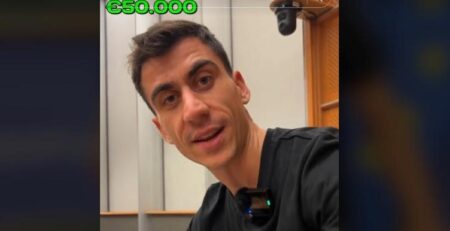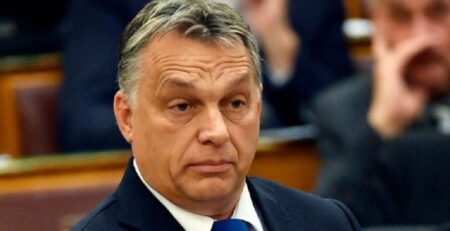Ο Πάπας Φραγκίσκος και η Πρόεδρος της Ευρωπαϊκής Επιτροπής Ursula von der Leyen συζήτησαν θέματα ανθρώπινης και κοινωνικής ανάπτυξης
Ο Πάπας Φραγκίσκος είχε σήμερα στο Βατικανό ιδιαίτερη συνάντηση με την Πρόεδρο της Ευρωπαϊκής Επιτροπής, Ursula von der Leyen, κατά την οποά σημείωσαν τις καλές διμερείς σχέσεις μεταξύ της Αγίας Έδρας και της Ευρωπαϊκής Ένωσης, συμπεριλαμβανομένων των πρωτοβουλιών που βρίσκονται σε εξέλιξη για τον εορτασμό της 50ης επετείου από την καθιέρωση των διπλωματικών σχέσεων.
Ανακοίνωση του Γραφείου Τύπου της Αγίας Έδρας αναφέρει ότι την συζήτηση τους απασχόλησαν και θέματα σχετικά με την ανθρώπινη και κοινωνική ανάπτυξη, που επηρεάζουν τηνευρωπαϊκή ήπειρο, και για την διάσκεψη για το μέλλον της Ευρώπης. Και οι δύο ηγέτες εξέτασαν επίσης άλλα θέματα κοινού ενδιαφέροντος, όπως τις κοινωνικές συνέπειες της πανδημίας και τα θέματα της μετανάστευσης, της κλιματικής αλλαγής και των πρόσφατων εξελίξεων στη Μέση Ανατολή.
We share the conviction that it is important and urgent to act to protect the Earth, our common home. Europe does its share, by becoming climate neutral by 2050.
We also discussed the need for a humane approach to migration rooted in solidarity. pic.twitter.com/ib9gtgExq3
— Ursula von der Leyen (@vonderleyen) May 22, 2021
Η Von der Leyen συναντήθηκε αργότερα με τον Καρδινάλιο Pietro Parolin, υπουργό Εξωτερικών του Βατικανού, συνοδευόμενο από τον Αρχιεπίσκοπο Paul Richard Gallagher, γραμματέα σχέσεων με κράτη.
Η Πρόεδρος της Ευρωπαϊκής Επιτροπής έδωσε συνέντευξη στον Mario Galgano των ειδήσεων του Βατικανού.
With 50 years of diplomatic relations between the Holy See and the European Union, how are the relations today between the Vatican and the EU?
The relations between the Holy See, the Vatican, and the European Union are excellent. And 50 years this shows how much we are like-minded. The good cooperation is basically based on sharing the same values, working for peace, for solidarity, for the dignity of the human being. These are shared values and more of them (others too). And of course, we are following very closely the grand topic of the Vatican, the globalization of solidarity, very close to our hearts. And we are very grateful for the interest of the Vatican in our Conference on the Future of Europe. So these are just a few topics that show how intense, how good the relations are.
We are living in a very difficult time today with the pandemic. The European Union supports the Holy Father’s appeals regarding fair distribution of vaccines through COVAX. How will the European Commission continue its efforts to tackle the global health crisis?
We all know that nobody will safe until everybody is safe, and all people must have access to affordable, safe, and effective vaccines. There are different routes you can choose. The European Union, through all the difficulties we had in securing vaccines, stuck to the principle that half of the European production is going to other countries. It is 90 different countries where European production is going to, that is one part.
Of course, the second part is of utmost importance, COVAX. The European Union is one of the largest funders of COVAX, and indeed yesterday we had a G20 summit where Team Europe pledged 100 million doses for COVAX. This is so important to pledge doses in kind now because of the scarcity of vaccines all over the place. But we had another success yesterday. Our industrial partners, BioNtech Pfizer, Johnson & Johnson, and Moderna, committed to deliver this year 1.3 billion doses of vaccines specifically for low-income countries as non-profit and for middle-income countries as low costs. Now, these are three routes: export, donations, and industrial partners.
On the top, comes a fourth topic, which is dear to my heart. Team Europe is now working together with our African partners to build up manufacturing capacities in Africa itself. This is not for the short term, but for the medium and long term. So, we come with the technologies, with industrial partners, massive investment, but it’s about also skilling personnel so that in the medium term, Africa is independent to produce its own vaccines.
For Pope Francis, one of the most important current challenges is also the environmental issue. As he writes in his encyclical Laudato si’, it is an “urgent challenge to protect our common home”. How can and should Europe act in the search for sustainable and integral development because we know things can change very quickly?
I’m deeply grateful for Laudato si’ and the positive push it gave. So, this overall call for protecting our planet, our nature, and the climate. And the European Union was committed from the very beginning. In my mandate, the first and most important topic I placed is the European Green Deal. The European Union will be the first continent to be climate neutral in 2050. And we have now the first-ever European climate law. We not only have goals but put in law, we now, step by step show how we want to reach climate neutrality and the reduction of greenhouse gas emissions by 2030.
It is a huge task, but first of all, if we would not act, the consequences would be horrible. We sense already what it means to have climate change. But it is also in a broader sense our responsibility for our children and grandchildren. If they want to have nature, if we want them to experience Spring, Summer, Fall, and Winter as we had it, we urgently have to act now. And therefore, the European Union is bringing its share. We are also working hard to bring the world along, and I am glad to see that now South Korea, South Africa, Japan, China, and the United States all have defined goals when to reach climate neutrality and move forward. So Laudato si’ has really been a wake-up call.




